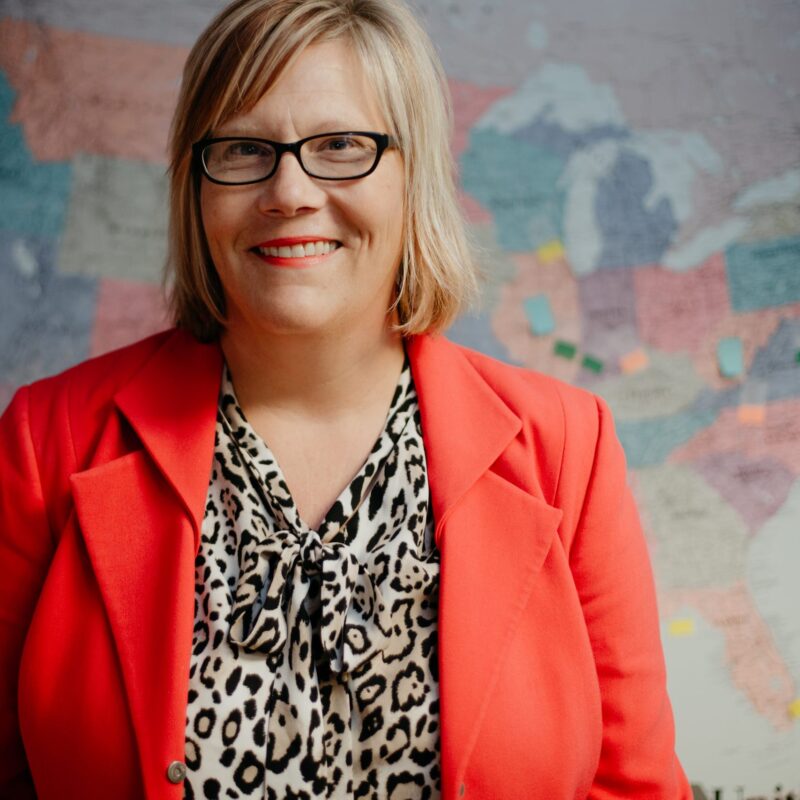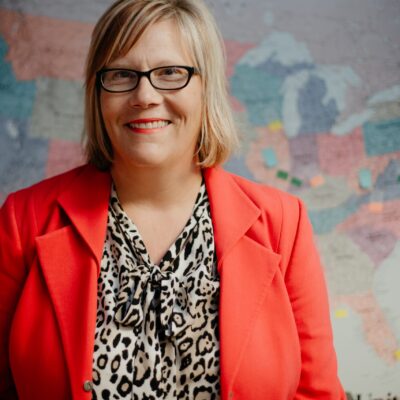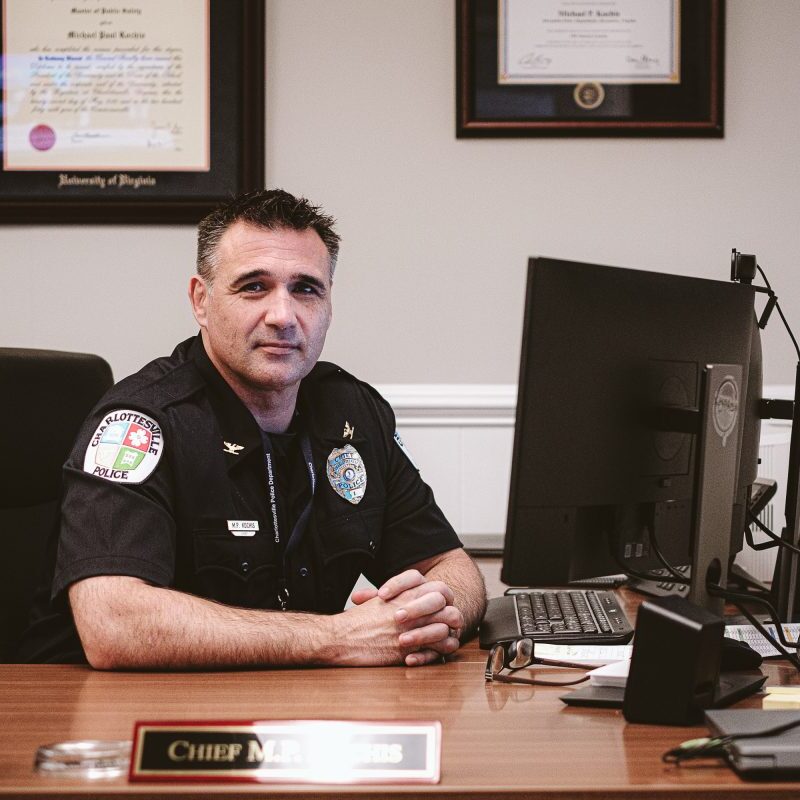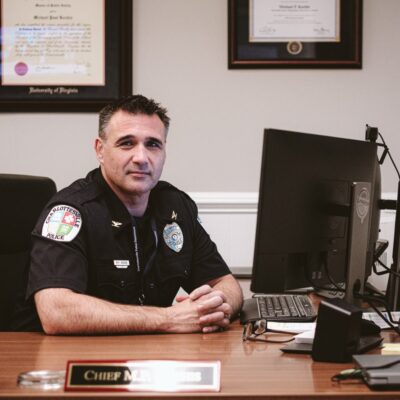The Investors
You know the saying, “Money makes the world go ’round.” A bit crass, but apt for the group we’re about to profile. Money, of course, plays its role, and the people behind the money can be kingmakers or kings in a town of this size. Why do we have so many successful investors in Charlottesville? Three reasons. First, money likes company and there’s been money here for a long time. Second, if you’re playing in a global marketplace, you can live anywhere as long as you can fly to New York—or Omaha, for that matter. Third, UVA’s got two business schools. Apparently people get attached to the place and decide to start private equity firms.
|
Ted Weschler (Photo by Jen Fariello) |
1. Ted Weschler
Investment manager at Berkshire Hathaway
In 2010, Ted Weschler was a successful hedge fund manager with a mergers and acquisition background who happened to be a low-key owner of The Hook. Flash forward two years, and the Charlottesville resident is one of Warren Buffett’s key lieutenants at Berkshire Hathaway, potential heir to a large chuck of the company’s $100 billion investment portfolio alongside fellow hedge fund samurai Todd Combs. What happened? The Wharton graduate was fortunate enough (emphasis on fortune) to win a lunch with the legendary stock picker when he bid $2,626,311 at Buffett’s annual charity auction.
Often compared to Buffett, his role model, for their similar investment strategies, Weschler, 50, was already a star before Buffett tapped him for the job at BH on account of his remarkable record at Peninsula Capital Advisors, the hedge fund he founded in 1999 on Main Street. But the friendship he and the Oracle of Omaha forged over two charity lunches (yes, there were two) has changed his power footprint entirely.
Weschler maintains a low profile for a near billionaire, but he has a quiet yet strong influence in Charlottesville. He made a total of $48,500 in campaign contributions in 2011, over half of that sum going to Governor Bob McDonnell’s Opportunity Virginia PAC. He has also served on the boards of prominent local companies like Virginia National Bank. Weschler continues to live in Charlottesville and make weekly trips to Berkshire Hathaway headquarters in Omaha, Nebraska. As his stock at Berkshire Hathaway continues to rise, Weschler’s power and influence in Charlottesville will likely follow suit, since both Weschler and Buffett claim they like to “buy what they know.” Ask the Daily Progress about that one.
2. Hunter Craig
Vice Chairman and co-founder of Virginia National Bank
2011 didn’t look like a year in which Hunter Craig’s star would rise. On the hook for close to $40 million along with his father-in-law, Wick McNeely, for the failure of Biscuit Run, Craig is embroiled in a state tax appeal that could have a significant impact on his net worth. On top of that, the highly publicized debacle dented his reputation as a solid gold developer with a list of investors that we could have published on its own for this issue. Fast forward to May, and Craig faced the prospect of something like a hostile takeover attempt from Mark Giles (No. 5 on this list) to retain his seat of power at Virginia National Bank, which he co-founded in 1998. What doesn’t kill you makes you stronger, right?
Craig was one of the three members of the UVA Board of Visitors’ executive committee to accept President Teresa Sullivan’s resignation, and then a week later he was one of the three Board members to request a meeting to vote on her reinstatement. He is also the director of the UVA Foundation, which helps the University manage financial and real estate assets and use or administer gifts and grants. As one of two local members of the Board of Visitors, Craig’s back-and-forth on Sullivan shows how heavily the decision is weighing on him. A lifelong Charlottesvillian, Craig donated $25,000 to Governor McDonnell’s Opportunity Virginia PAC in 2010 and made $33,301 in contributions to McDonnell’s 2009 gubernatorial campaign. As of 2011, Craig holds 1,305 acres with an approximate assessed value of $126 million. If we were ranking power across categories, his range of influence, deep roots, and stiff chin would make him an easy top five pick.
3. Jaffray Woodriff and Michael Geismar
Founders of Quantitative Investment Management
Jaffray Woodriff is only 42 years old and he’s easily the most Googled name in the C-VILLE archives. Oh, and he also started Quantitative Investment Management, one of the world’s biggest managed futures firms with more than $4 billion at its disposal.
Woodriff grew up on a farm in Virginia and graduated from UVA’s McIntire School of Commerce in 1991. A self-taught trader, he started Blue Ridge Trading the same year in a rented apartment. After a decade of making bets with other people’s money, Woodriff began trading with his own coin. In 2003, he and Michael Geismar, his college roommate, started QIM on Market Street, and began taking in outside money. The company has earned nearly $2 billion for its investors using its method of “quantitative behavioral finance,” and Forbes estimated Woodriff’s personal earnings alone at $90 million.
Geismar made headlines recently for a $710,000 blackjack run at a weekend conference in Las Vegas, during which he applied the math theory (he has a B.S. in math from UVA) and the gambler’s mentality QIM employs to beat the house. He later announced his intention to donate his winnings to his charities, the MLG Foundation and the PB&J Fund.
4. Robert Hardie
Managing director of Level One Partners
Robert Hardie is something of a Renaissance man. The managing director of investment firm Level One Partners, Hardie also chairs Intrinergy LLC, a Richmond-based company that develops renewable energy technology, and serves as director of The Riverstone Group, a company owned by his father-in-law that’s been snapping up luxury hotel properties in Virginia, South Carolina, and Tennessee. Most recently, Riverstone acquired Keswick Hall, a storied playground for Central Virginia’s money crowd.
Hardie also serves on St. Anne’s Belfield School’s Board of Trustees and, oh, by the way, he’s on the UVA Board of Visitors. He was appointed to the board back in 2008 by Tim Kaine (Hardie was a big-ticket supporter of the former governor), but he’s been a Wahoo for years. Hardie got his B.A. in 1987, and in 1999, he earned a Ph.D. in management from Darden. He even worked as an adjunct professor at Darden from 1999 to 2007.
As the Sullivan saga unfolds, Hardie has been thrust into the local limelight as one of two notable abstentions on the vote to install Carl Zeithaml as interim president of the University. When Hardie’s term on the Board comes to an end in July, it will be Governor Bob McDonnell’s call whether he’s appointed for four more years, but before that happens he’ll cast an important vote on Sullivan’s future. Regardless of whether he’s reappointed to the Board, Hardie will continue to punch his weight in Charlottesville, on and off Grounds.
5. Mark Giles
Managing director of Panda Holdings, LLC
Mark Giles was chairman and CEO of Virginia National Bank before he stepped down last December, in part to protest the influence of Vice Chairman Hunter Craig and VNB co-founder Wick McNeely, whom he felt dragged VNB through the mud during the Biscuit Run fiasco. Giles tried unsuccessfully to climb his way back onto the board earlier this year, but ultimately came up way short on the votes he needed to move his agenda. Still, Giles is a respected figure in the local finance community and serves on a number of boards, including the Thomas Jefferson Area United Way, Computers4Kids Program, Charlottesville Regional Chamber of Commerce, Diffusion Pharmaceuticals, and Martha Jefferson Hospital. The managing member of Panda Holdings, LLC, which invests and manages private capital, Giles received a B.S. from the McIntire School of Commerce at UVA in 1977, and a JD from the UVA School of Law in 1980. When the Paramount Theater was facing a budget crisis, its board looked to Giles to bring stability, and he took over the position of Chairman of the Board, which governs the theater in terms of staffing, programming, and finances.
IF I HAD THE POWER…
|
Lynn Wiber (Photo by John Robinson) |
Lynn Wiber
Homeless advocate, age 55
“In high school, I had this impossible dream to run the world behind the scenes. Some 35 years later, I’d still like to be the power behind the throne, even for a day, to bring about social change. These are some of the things I would do:
Everyone would pay their fair share of taxes. Everyone. Corporations, small businesses, and every economic class. The key word here is fair. Parents who stay home with their kids would be paid a salary, and would have to take child-rearing classes to become eligible. Day care would be part of the education system. Health care would be for everyone, not just for those who can afford it. Hospitals would be in the business of taking care of sick people and not just making profits at the expense of patient care. Those who offer essential services—like firefighters, RNs, paramedics, EMTs—would be well compensated. I believe that if you pay peanuts, you get monkeys.
Locally, public transportation should be extended north to Hollymead Town Center and south to the regional jail. Instead of the local business association opposing The Haven, they would build a partnership to provide job training to the poor and homeless so they can get back to work.
Rather than a new hotel at the corner of Main and McIntire, let’s erect a building that would offer housing to all income levels. I do know this: I’d have already made the nine units at The Crossings available to the county residents they were promised to—our citizens should not be sleeping on the streets.
Basically, it comes down to this: People should be considered more important than profit. Only if the Federal, state, and local governments team up with private citizens, nonprofits, and charities can this kind of sea change come about. If I were in charge, it would have already happened.”
/Ted-Weschler.jpg)
/Lynn-Wiber.jpg)





